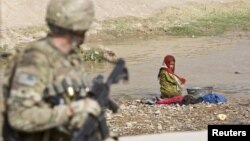ISLAMABAD, Pakistan - The United Nations says civilian casualties in Afghanistan have dropped by more than 20 percent in the first four months of this year as compared to the same period in 2011.
It is the first time in five years that civilian casualty numbers have gone down. The news comes as international troops are preparing to withdraw from the country and Afghan forces start to take over responsibility for the nation's security.
Speaking at a news conference in Kabul, the U.N.'s special representative to Afghanistan, Jan Kubis, said 579 civilians had been killed and 1,216 had been injured in the first four months of this year.
Kubis said insurgent forces were responsible for almost 80 percent of the dead and injured, the result of buried bombs and suicide attacks.
"These are two tactics or weapons that they are using that are indiscriminately killing everyone who is around. This is inexcusable," said Kubis.
Kubis added that pro-government forces were responsible for just nine percent of all civilian casualties, as they worked to reduce the impact of the war on civilians.
"And unfortunately, regretfully, the anti-government forces they don't show this respect for civilians," Kubis noted.
Another 12 percent of civilian casualties were not attributed.
Kubis' statements came just days after a coalition airstrike in the eastern province of Paktia killed eight members of a family. The area is one where Afghan and coalition troops are fighting the Taliban insurgency.
Deaths of Afghan civilians in anti-insurgency operations have been a major irritant between President Hamid Karzai's government and the U.S.-led NATO forces.
U.S. and other international combat troops are due to exit Afghanistan by 2014.
Kubis said that with the proper level of international help, Afghan forces will be able to secure their nation.
"Both military experts and the facts on the ground are telling me that, yes, the Afghan national security forces, provided they will get this continuous, strong massive support, financial support from the international community, should be able to deliver," Kubis said.
International donors are considering providing Afghanistan more than $4 billion to finance its national army and police.
But Kubis said that while Afghanistan remains a priority, major donor countries have budgetary problems of their own. He said the leadership in Kabul would have to do its share to improve governance in the country.
It is the first time in five years that civilian casualty numbers have gone down. The news comes as international troops are preparing to withdraw from the country and Afghan forces start to take over responsibility for the nation's security.
Speaking at a news conference in Kabul, the U.N.'s special representative to Afghanistan, Jan Kubis, said 579 civilians had been killed and 1,216 had been injured in the first four months of this year.
Kubis said insurgent forces were responsible for almost 80 percent of the dead and injured, the result of buried bombs and suicide attacks.
"These are two tactics or weapons that they are using that are indiscriminately killing everyone who is around. This is inexcusable," said Kubis.
Kubis added that pro-government forces were responsible for just nine percent of all civilian casualties, as they worked to reduce the impact of the war on civilians.
"And unfortunately, regretfully, the anti-government forces they don't show this respect for civilians," Kubis noted.
Another 12 percent of civilian casualties were not attributed.
Kubis' statements came just days after a coalition airstrike in the eastern province of Paktia killed eight members of a family. The area is one where Afghan and coalition troops are fighting the Taliban insurgency.
Deaths of Afghan civilians in anti-insurgency operations have been a major irritant between President Hamid Karzai's government and the U.S.-led NATO forces.
U.S. and other international combat troops are due to exit Afghanistan by 2014.
Kubis said that with the proper level of international help, Afghan forces will be able to secure their nation.
"Both military experts and the facts on the ground are telling me that, yes, the Afghan national security forces, provided they will get this continuous, strong massive support, financial support from the international community, should be able to deliver," Kubis said.
International donors are considering providing Afghanistan more than $4 billion to finance its national army and police.
But Kubis said that while Afghanistan remains a priority, major donor countries have budgetary problems of their own. He said the leadership in Kabul would have to do its share to improve governance in the country.





